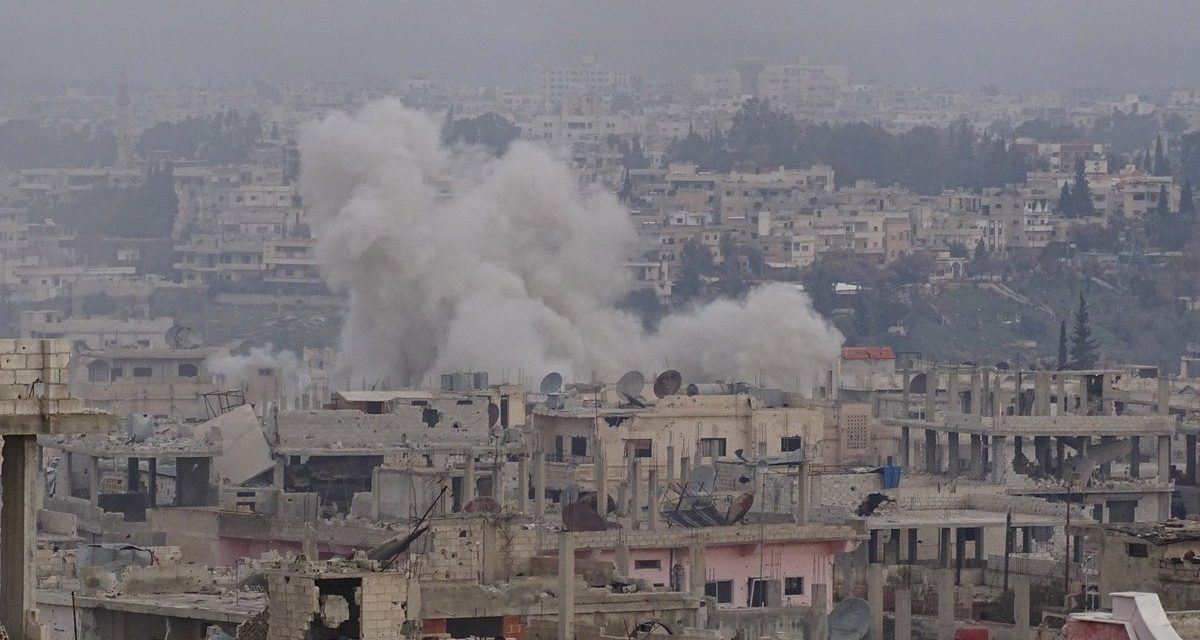Human Rights Watch documents eight chemical attacks by Assad regime on opposition areas of Aleppo city between November 17 and December 13
LATEST
Assad regime forces carried out coordinated chemical attacks on opposition areas of Aleppo during the final month of their offensive to take control of all of Syria’s largest city, Human Rights Watch said on Monday.
HRW documented regime helicopters dropping chlorine in residential areas on at least eight occasions between November 17 and December 13, 2016. The attacks, some of which included multiple munitions, killed at least nine civilians, including four children, and injured around 200.
HRW said the number of attacks could be higher, as journalists, first responders, medical personnel, and others reported at least 12 incidents. The report only cite attacks corroborated through both real-time reporting on social media and interviews with at least one witness.
The attacks took place in areas where regime forces planned to advance, starting in the east and moving westwards. “The pattern of the chlorine attacks shows that they were coordinated with the overall military strategy for retaking Aleppo, not the work of a few rogue elements,” said Ole Solvang, HRW’s deputy emergencies director.
The findings are based on phone and in-person interviews with witnesses and analysis of video footage, photographs, and posts on social media.
The report comes days after a 64-page study by The Atlantic Council detailed the bombing, siege, and disinformation pursued by the Assad regime and its allies — notably Russia and Iran — to complete the reoccupation of Aleppo in December.
See Syria Report: The “Breaking of Aleppo” by Russia, Iran, and the Assad Regime
After its sarin attacks near Damascus in August 2013, killing more than 1,400 people, the Assad regime handed over almost most of all of its chemical stockpile under international pressure. However, the regime then resorted to the use of chlorine on numerous occasions — three of them officially confirmed by UN investigators — from spring 2014. Some of those claimed attacks were on Aleppo through summer and autumn 2016, as a siege was imposed on the opposition districts.
Because of its domestic uses, chlorine is not banned under international conventions on chemical weapons.
TOP PHOTO: Treatment of a boy after a claimed chemical attack on an opposition area of Aleppo, September 2016
UN Appeals for Access to Besieged “Four Towns”
The UN has again appealed for immediate access to the besieged “four towns” — opposition-held Maadaya and Zabadani, northwest of Damascus, and regime-held al-Fu’ah and Kafraya in Idlib Province.
Ali al-Za’tari, the UN Resident and Humanitarian Coordinator for Syria, said the situation is a “looming humanitarian catastrophe” as access has not been permitted since November.
Madaya and Zabadani have been cut off by the regime since July 2015, with scores of people dying from starvation. The regime enclaves in Idlib Province have been surrounded by rebels for years, although re-supply has been possible through airdrops.
Rebels: We Will Not Attend Geneva Talks
Leading rebel factions said on Monday that they may not attend next week’s political talks in Geneva, following a compromise between the opposition’s High Negotiations Committee and Russia.
The HNC said on Sunday that it will include “alternative” figures, preferred by Russia, on the 21-member delegation for the February 20 indirect talks with the Assad regime.
Mohammad Alloush, a senior official of the Jaish al-Islam rebel faction, was replaced by senior HNC member Mohammad Sabra as the lead negotiator. Nasr al-Hariri, a long-time opposition figure from southern Syria. will head the delegation.
See Opposition-Rebel Bloc Includes “Alternative” Members for Geneva Talks
Jaish al-Islam said that it will not participate in any talks until the opposition-rebel demands from Astana are fulfilled. The bloc is seeking a meaningful ceasefire, release of detainees, and an end to sieges before transitional political arrangements are considered.
Mohammad al-Aboud, a senior rebel official, later told Reuters, “There were violations in the ceasefire and the Russians did not live up to their promises to halt these violations.”
A second rebel official said at most a handful of rebels might attend, but only if progress was seen in the next two days: “The (whole) delegation will not go.”

